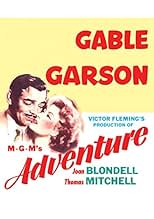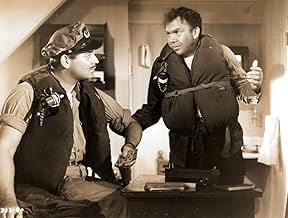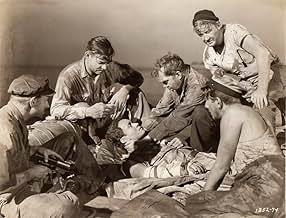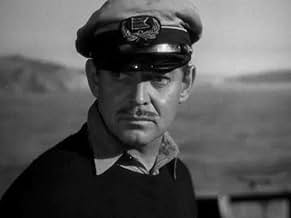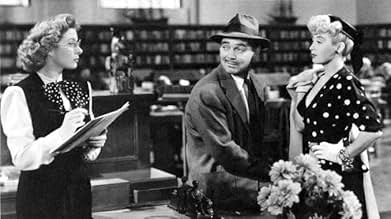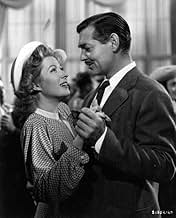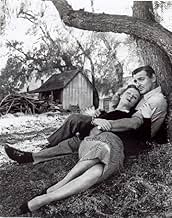IMDb RATING
6.1/10
1.3K
YOUR RATING
Dark, romantic, complicated drama about a rowdy merchant mariner and sophisticated librarian who clash over their lifestyles and values - and then fall in love.Dark, romantic, complicated drama about a rowdy merchant mariner and sophisticated librarian who clash over their lifestyles and values - and then fall in love.Dark, romantic, complicated drama about a rowdy merchant mariner and sophisticated librarian who clash over their lifestyles and values - and then fall in love.
- Awards
- 2 wins total
Stanley Andrews
- Bit Part
- (unconfirmed)
Florence Auer
- Landlady
- (unconfirmed)
Pedro de Cordoba
- Felipe
- (unconfirmed)
Rex Ingram
- Preacher
- (unconfirmed)
Garry Owen
- Jabbo
- (unconfirmed)
Harry Wilson
- Big Mug
- (unconfirmed)
Richard Abbott
- Clerk
- (uncredited)
Featured reviews
You have to see the movie to learn what "it" refers to. You will also learn how to lure chickens properly, how to regain your "soul", what San Fran looked like in 1945, how to attract a woman by dating her roommate, how to throw rocks at your lover, how snappy dialogue and lively acting can be much more entertaining than the 90% of the c**p in today's "subtle" acting movies. No "adventure" here in today's terms but quite daring and emotional in its own way.
"Adventure" is an oddly generic title for such a singularly unique motion picture. Its superficial values are appealing enough--the Gable bluster is rarely put to such good use, and Garson is possibly the only actress with enough mettle to match him--but these attributes are hardly unusual and neither, indeed, is the storyline. What makes the effort favorably surprising is the story's aspiration to allegory through the use of poetics, which may occasionally seem overt but which never fail to ring true. It's an ambitious undertaking, and it works.
In its time, the movie was dismissed for being both formulaic and even crude, which in itself betrays either an ignorance of its higher aspirations or, more likely, a reluctance to take them seriously. America in 1945 prided itself on street smarts and industrial might; on its not being taken for a sucker. It had saved Europe from the axis forces and was about to embark on a socioeconomic boom such as the world had never seen: It wasn't interested in philosophical musings about the nature of the soul. The idea that these musings could be given dimension in a simple and often predictable story about a rakish sailor and a repressed librarian drove reviewers to pronounce the script "foolish" and the poetic commentary "gibberish."
But it is these very elements, this oddly ardent coloring, that have somehow deepened and mellowed with time, and which now provide the film with the kind of rich, subtle flavor found in only the most treasured vintages. More unique still is that the movie is less interested in the sentimentality of its story than in the metaphysical questions it poses. Its chief accomplishment is in avoiding any academic exploration of such questions (a choice which parallels the arc of the story itself), and it does so by illustrating with large, colorful brushes. Only the intelligence of the director and the skill of his actors keep the proceedings from veering off into caricature, a tipping point that when straddled with such finesse is delightful viewing indeed.
In its time, the movie was dismissed for being both formulaic and even crude, which in itself betrays either an ignorance of its higher aspirations or, more likely, a reluctance to take them seriously. America in 1945 prided itself on street smarts and industrial might; on its not being taken for a sucker. It had saved Europe from the axis forces and was about to embark on a socioeconomic boom such as the world had never seen: It wasn't interested in philosophical musings about the nature of the soul. The idea that these musings could be given dimension in a simple and often predictable story about a rakish sailor and a repressed librarian drove reviewers to pronounce the script "foolish" and the poetic commentary "gibberish."
But it is these very elements, this oddly ardent coloring, that have somehow deepened and mellowed with time, and which now provide the film with the kind of rich, subtle flavor found in only the most treasured vintages. More unique still is that the movie is less interested in the sentimentality of its story than in the metaphysical questions it poses. Its chief accomplishment is in avoiding any academic exploration of such questions (a choice which parallels the arc of the story itself), and it does so by illustrating with large, colorful brushes. Only the intelligence of the director and the skill of his actors keep the proceedings from veering off into caricature, a tipping point that when straddled with such finesse is delightful viewing indeed.
I'm 65 and I have appreciated Gable's contributions over his career. I did not see Adventure on the silver screen but only this afternoon on TV, and so I cannot think back to how it was received at the time. Our mindsets are different now, anyway, and so I'm now wondering whether anyone else today besides me becomes worn down by his dialog? I'm sorry, but his constant barking finally got to me and I had to turn this one off. What's he doing anyway, schtik? I can imagine his answering even "one lump or two?" in high dudgeon. That just gets tiresome after a while, until such affectation of anger, indignation, resentment or whatever degenerates almost into buffoonery. Not everything has to be expressed frankly, my dear.
I'm giving this movie 6 stars for the sheer pleasure of looking at Greer Garson, one of my favorites.
But I'd put this movie alongside "Remember?" as the weakest Garson films. For me, the problem was Clark Gable.
Gable is given the kind of typical "rough guy the dames falls for" role that made him a star...a combination of bluster and charm that won over Jean Harlow or Myrna Loy or Claudette Colbert.
Here, I think it's too much bluster and too little charm to realistically connect with Garson in the role she's given.
One pleasure here is seeing Joan Blondell -- she did lots of good work after the '30s musicals that she's best remembered for.
Also good: Thomas Mitchell.
Overall: see it once for the novelty of it, or skip it altogether,
But I'd put this movie alongside "Remember?" as the weakest Garson films. For me, the problem was Clark Gable.
Gable is given the kind of typical "rough guy the dames falls for" role that made him a star...a combination of bluster and charm that won over Jean Harlow or Myrna Loy or Claudette Colbert.
Here, I think it's too much bluster and too little charm to realistically connect with Garson in the role she's given.
One pleasure here is seeing Joan Blondell -- she did lots of good work after the '30s musicals that she's best remembered for.
Also good: Thomas Mitchell.
Overall: see it once for the novelty of it, or skip it altogether,
Maybe because STRANGE CARGO, THE HUMAN COMEDY and A GUY NAMED JOE dealt with whimsy and religious fantasy successfully, MGM kept trying with this kind of picture. But HIGH BARBAREE and ADVENTURE (both based on what must have been gassy novels) are dull failures.
I must dissent with the majority view here that ADVENTURE is good and that Clark Gable and Greer Garson are good in it. They are a dismal mismatch as a romantic team and neither is suited to this kind of heavy, 'meaningful' material. In their very different ways, both stars were grounded, practical, sensible, which is not what was needed to bring off this type of romantic fantasy. When they meet and for a long time after, Gable and Garson give too successful an impression of mutual loathing for us to believe later that they have suddenly discovered their great love for each other. Victor Fleming does a very glossy professional job directing this film and both stars get dazzling, dynamically framed closeups and two-shots, but they never seem right for each other. By contrast, in a supporting role, Joan Blondell seems exactly right for Gable, being his female equivalent, having humor and a juicy kind of sensuality.
ADVENTURE is anything but, and the mystical themes never make any sense and are never convincingly connected to the romance. It was a big hit, presumably because people were curious to see these stars together, and to catch Gable's first picture after the war. But this could only have diminished the luster of both of them. And pictures like this must be why Dore Schary was brought into the studio to supplant Louis B. Mayer, who had become lazy and complacent, squandering his two biggest stars on pretentious garbage.
I must dissent with the majority view here that ADVENTURE is good and that Clark Gable and Greer Garson are good in it. They are a dismal mismatch as a romantic team and neither is suited to this kind of heavy, 'meaningful' material. In their very different ways, both stars were grounded, practical, sensible, which is not what was needed to bring off this type of romantic fantasy. When they meet and for a long time after, Gable and Garson give too successful an impression of mutual loathing for us to believe later that they have suddenly discovered their great love for each other. Victor Fleming does a very glossy professional job directing this film and both stars get dazzling, dynamically framed closeups and two-shots, but they never seem right for each other. By contrast, in a supporting role, Joan Blondell seems exactly right for Gable, being his female equivalent, having humor and a juicy kind of sensuality.
ADVENTURE is anything but, and the mystical themes never make any sense and are never convincingly connected to the romance. It was a big hit, presumably because people were curious to see these stars together, and to catch Gable's first picture after the war. But this could only have diminished the luster of both of them. And pictures like this must be why Dore Schary was brought into the studio to supplant Louis B. Mayer, who had become lazy and complacent, squandering his two biggest stars on pretentious garbage.
Did you know
- TriviaAny reports of this film's financial failure are false. Variety (January 8, 1947) listed it as the #7 box office hit of 1946. (It was released December 28, 1945.) The film earned more than $6M worldwide and earned a profit for MGM.
- GoofsWhen the Buckleys drive away from Emily's house in the country, a clear reflection of the boom microphone can be seen on the right rear passenger window and other areas of the highly-polished car as it drives off.
- Quotes
Harry Patterson: There ain't a dame I can't forget in six months.
- ConnectionsFeatured in Clark Gable: Tall, Dark and Handsome (1996)
- SoundtracksDown in the Valley
(a.k.a. "Birmingham Jail")(uncredited)
- How long is Adventure?Powered by Alexa
Details
Box office
- Budget
- $3,500,000 (estimated)
- Runtime
- 2h 5m(125 min)
- Color
- Aspect ratio
- 1.37 : 1
Contribute to this page
Suggest an edit or add missing content

